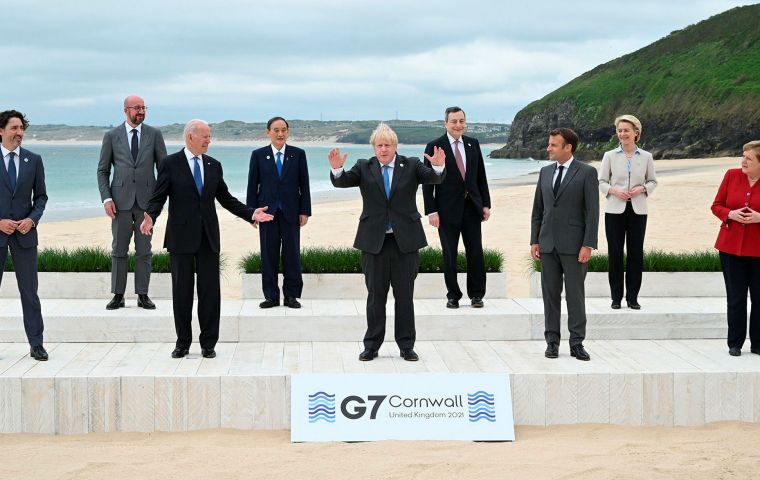MercoPress. South Atlantic News Agency
G7 Summit ends with signing of Carbis Bay Declaration to “end the pandemic”
 “The G-7 summit was an “extraordinarily collaborative and productive meeting,” said Biden
“The G-7 summit was an “extraordinarily collaborative and productive meeting,” said Biden The world's wealthiest democracies Sunday signed the Carbis Bay Declaration whereby they all pledged to “end the pandemic and prepare for our futures” as well as to “build back better.”
After a three-day meeting at the seaside town of Cornwall, England, heads of Britain, the United States, Canada, France, Germany, Italy and Japan delivered the new document whereby they all vowed to “reinvigorate our economies” with a US $ 12 trillion funding to assist those in need to recover from the covid-19 crisis.
Also taking part in the event to discuss global health matters were leaders of South Korea, South Africa and Australia and U.N. Secretary-General Antonio Guterres. European Union and European Commission heads were also present, while India's Prime Minister Narendra Modi joined virtually.
U.S. President Joseph Biden told reporters that the G-7 summit was an “extraordinarily collaborative and productive meeting” towards reviving the global economy and calling out China for its negative role in recent international events, while at the same time progress had been made in tackling corruption, fighting ransomware and ending public finance for coal projects.
The concluding statement acknowledges the need to tackle the roots of the pandemic on a global level and to bring about a worldwide response in no more than 100 days, including the development of vaccines. “There was a clear consensus among all our colleagues at the G-7 that this wasn’t the end,” Biden said. “We were going to stay at it until we’re able to provide for the needs of the whole world.”
The President also underlined that “America is back at the table,” said Biden, after the years of the Donald Trump administration. “I think we've made some progress in reestablishing American credibility among our closest friends” as “the lack of participation in the past and full engagement was noticed significantly ... by the people in the G-7 countries.”
The G-7 leaders announced one billion doses of vaccines for the world, half of them from the United States, and agreed on a series of actions to both ends the current pandemic well as prevent a future one.
But the wealthiest leaders failed to agree despite pressure from humanitarian groups and around 100 World Trade Organization member countries to waive intellectual property protections of vaccine technology — the so-called WTO TRIPS waiver, for which British Prime Minister Boris Johnson and German Chancellor Angela Merkel took most of the flak as they insisted on defending the monopolies of pharmaceutical companies over people’s lives.
The most G-7 leaders could do was to “explore all options” to ensure that lowest-income countries have access to vaccines, including “non-profit production, tiered and transparent pricing” and asking manufacturers to share ten per cent of the doses produced with COVAX, the United Nations vaccine-sharing mechanism.
Biden also underscored that this time around “there is mention of China.” The G-7 explicitly agreed to call out human rights abuses, and Xinjiang and Hong Kong. China has harshly cracked down on mainly Muslim-minority Uyghurs in Xinjiang and repressed Hong Kong's pro-democracy movement.
The communique says the G-7 “will continue to consult on collective approaches to challenging non-market policies and practices which undermine the fair and transparent operation of the global economy. It also calls on Beijing “to respect human rights and fundamental freedoms, especially concerning Xinjiang and those rights, freedoms and a high degree of autonomy for Hong Kong enshrined in the Sino-British Joint Declaration and the Basic Law.”
Biden also pointed out that “China has to start to act more responsibly in terms of international norms on human rights, and transparency.”
The group announced a new infrastructure financing mechanism for low and middle-income countries, called “Build Back Better World,” or “B3W,” designed to rival China's Belt and Road Initiative—the global infrastructure development investment strategy central to Beijing’s foreign policy. The scope and source of the financing are still unclear.
China replied by saying that the days when global decisions were dictated by a “small group” of countries are long gone.
Meanwhile, Johnson highlighted the summit's achievements in environmental issues. “I think it has been a highly productive few days,” noting the nations agreed to raise their contributions to meet an overdue annual spending pledge of US $ 100 billion a year to assist poorer countries in reducing carbon emissions and coping with global warming.
Biden on Sunday evening headed to Brussels for two days of meetings with NATO and EU leaders before his much-anticipated talks with Putin on Wednesday in Geneva. But before leaving England, he and First Lady Jill Biden had tea with Queen Elizabeth at Windsor Castle.
The 95-year-old British monarch later had a private meeting with Biden in a setting that was described as “relaxed.” During her 69 years on the British throne, the longest reign of any English monarch, there have been 14 U.S. presidents, of which the Queen has met all bar, Lyndon Johnson.




Top Comments
Disclaimer & comment rulesCommenting for this story is now closed.
If you have a Facebook account, become a fan and comment on our Facebook Page!